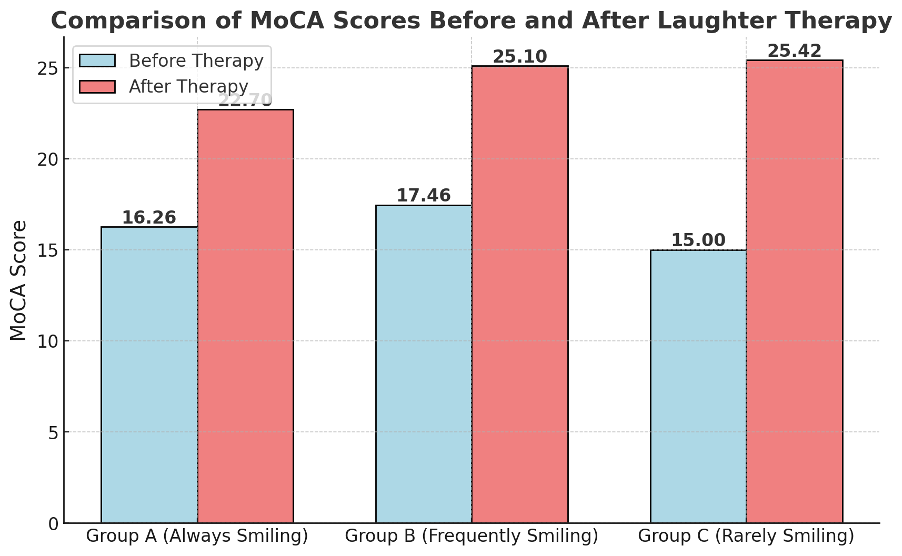
Published in: International Journal of Endorsing Health Science Research, Volume 7, Issue 1, 2019
Authors & Affiliations:
- Sonya Arshad, Syed Hasan Abbas Rizvi, Muhammad Faisal Qureshi, Minha Hanif, Imama Iftikhar, Majid Ayoub & Sanjay Kumar
- Institution: Liaquat National School of Physiotherapy, Pakistan
Background & Rationale of the Study
In modern society, people face increasing psychological stress and cognitive challenges due to social, economic, and professional pressures. Laughter therapy is known to have psychological and physiological benefits, but its impact on cognitive function had not been extensively studied.
What is Cognitive Function?
Cognitive function refers to an individual’s ability to think, learn, and remember. It includes:
- Memory
- Attention
- Problem-solving
- Language processing
- Decision-making skills
Why Laughter Therapy?
Laughter therapy has been linked to reducing stress and improving brain function. Scientific evidence suggests that laughter:
- Stimulates neurotransmitter release (endorphins, dopamine, and serotonin).
- Reduces stress hormones (cortisol and adrenaline).
- Enhances memory and learning by increasing oxygenation to the brain.
This study was conducted to determine whether laughter therapy can serve as an alternative or complementary approach to improving cognitive function.
Research Objectives
The primary objective of this study was to:
- Evaluate the effectiveness of laughter therapy in improving cognitive skills.
- Analyze how laughter influences neurotransmitter levels and cognitive performance.
- Assess whether individuals who smile less benefit more from laughter therapy.
Methodology
Study Design:
- Type: Uncontrolled experimental study.
- Location: Conducted at Liaquat National School of Physiotherapy, Pakistan.
- Sample Size: 80 participants (aged 18-30 years).
- Sampling Method: Convenience sampling.
Grouping of Participants
Participants were divided into three groups based on their natural tendency to smile:
- Group A (Always Smiling) → 26 participants
- Group B (Frequently Smiling) → 33 participants
- Group C (Rarely Smiling) → 21 participants
Assessment of Cognitive Function:
- Montreal Cognitive Assessment (MoCA) Test was used before and after laughter therapy.
- MoCA Test: A 30-point validated exam assessing:
- Memory
- Attention & Concentration
- Problem-solving
- Language abilities
- Visual-spatial skills
Laughter Therapy Protocol (25-Minute Session)
- 10 minutes: Participants watched three funny videos.
- 15 minutes: Participated in a Laughter Yoga session.
- Post-Therapy MoCA Test: Cognitive skills were reassessed.
Key Findings & Results
- All groups showed improvement in cognitive function after laughter therapy.
- Group C (Rarely Smiling) benefited the most, followed by Group B, and then Group A.
MoCA Scores Before & After Laughter Therapy
Group Before Therapy After Therapy
Group A (Always Smiling) 16.26 ± 5.80 22.70 ± 5.17
Group B (Frequently Smiling) 17.46 ± 4.38 25.10 ± 3.22
Group C (Rarely Smiling) 15.00 ± 5.47 25.42 ± 4.07
 Percentage Increase in Cognitive Function (MoCA Scores)
Percentage Increase in Cognitive Function (MoCA Scores)
Group Percentage Increase
Group A (Always Smiling) 28%
Group B (Frequently Smiling) 30%
Group C (Rarely Smiling) 40.9%

Interpretation:
- People who rarely smile (Group C) had the greatest cognitive improvement.
- Frequent smilers (Group B) showed moderate improvement.
- Always-smiling individuals (Group A) showed the least improvement.
- This suggests that individuals with less exposure to laughter may benefit the most from laughter therapy.
Discussion & Implications
Why Did Laughter Therapy Improve Cognitive Function?
- Reduced Stress Hormones:
- Laughter decreased cortisol and epinephrine, reducing stress.
- Increased Neurotransmitter Levels:
- Dopamine & serotonin levels increased, enhancing memory and focus.
- Increased Oxygenation & Blood Flow to the Brain:
- Laughter boosts cerebral circulation, improving cognitive processing.
- Engagement in Playful Activities:
- Laughter enhances mental agility and decision-making skills.
Conclusion
This study strongly supports the effectiveness of Laughter Therapy in enhancing cognitive skills.
Laughter therapy is a natural, low-cost, and effective tool to boost memory, focus, and learning ability.
People who smile less may benefit the most from incorporating laughter therapy into their routine.
Laughter therapy could be implemented in schools, workplaces, and healthcare as a mental wellness tool.


